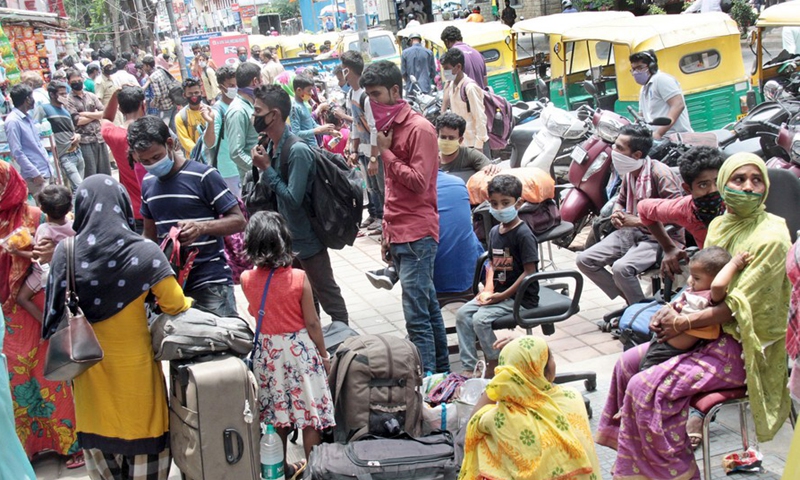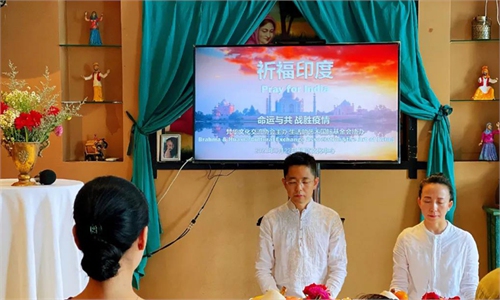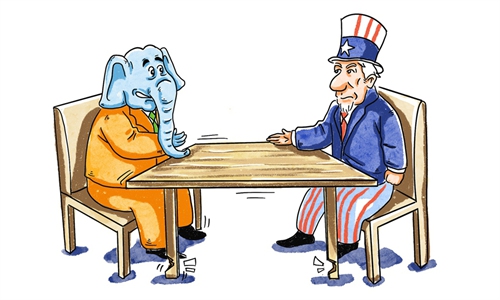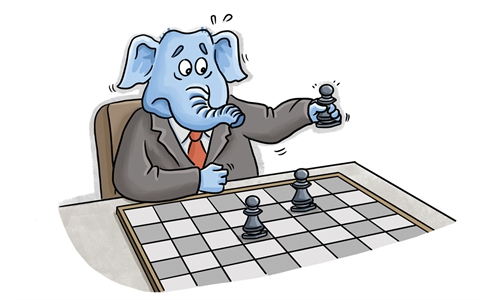India’s ‘50% China hand’ fans conspiracy theories

Indian migrant workers and their families are seen outside the bus transport booking center during the coronavirus pandemic, in Bangalore, India, April, 15, 2021.Photo:Xinhua
Indian newspaper Deccan Herald recently published an article entitled, "The question remains: Was it meant to be a bioweapon?" In this misleading article, the author Srikanth Kondapalli, a professor in Chinese Studies at Jawaharlal Nehru University, named some people and events trying to support his argument: COVID-19 is a "bioweapon in the making that intentionally or otherwise escaped from a low-security biosafety level 2 laboratory of the Wuhan Institute of Virology (WIV)." In a previous interview with News 18, Kondapalli said China is culpable on leakage of COVID-19.Kondapalli can be seen as a "50-percent China hand." He knows China relatively well, but he is not friendly to China. In fact, in major issues between China and India, he has a clear and constant stance that totally stands with New Delhi. Besides, he always resorts to sophistry in his argument.
Kondapalli's latest conspiracy theory about the origin of COVID-19 has something to do with the US' recent clamors that the WIV could be the origin of COVID-19.
In a Sunday report, the Wall Street Journal cited a "previously undisclosed US intelligence report" saying that three researchers from the WIV became "sick enough in November 2019 that they sought hospital care." This so-called evidence is completely groundless. On Monday, Chinese Foreign Ministry spokesperson Zhao Lijian refuted the report, saying it "is totally untrue."
Nonetheless, Kondapalli has taken this so-called evidence as the basis for his recent argument. And he has gone further than Americans by suspecting the virus is a bioweapon developed in China. This is very ridiculous and groundless. He is going out of his mind.
Military forces are usually believed to be behind the development of biological weapons. Kondapalli praises himself as being one of the top scholars in India who study China's military affairs. But without any concrete proof, it is irresponsible for Kondapalli to use sensational words to link the virus with Chinese military.
Does someone back Kondapalli and push him to the frontline against China? There is still no such evidence. If we focus on his recent argument, we can see it is not that influential because it is not widely accepted - even in the US.
Using extreme speculations to talk about the COVID-19 origins, Kondapalli, although a scholar, represents no more than himself. Even within India.
The conspiracy theory reflects that Kondapalli's opinions on China are becoming increasingly extreme. But it is still unclear if being extreme is out of his own will or if he is following orders by someone behind him.
Given the severe situation of India's epidemic, even if Kondapalli's opinions are read by some media professionals and elites, he can barely steer the wheel of public opinion. He is incapable of turning the tide in India.
Kondapalli's words can only be viewed as a reflection of the nonsense of a small group of irresponsible people in India, and a reflection of the lowest-level attacks on China by Indian elites. He cannot represent serious scientists in the world on this issue. Nor can his extremities save India from the nationwide disaster.
Indian people are suffering grief. But it cannot be said that they have turned their anger toward China. Most Indians don't trust China.
Such hostile attitudes are partly the result of last year's border standoff between China and India. Besides, the Indian government, which has fanned the flames of nationalism, should also be held accountable. However, New Delhi is aware that it cannot link such large-scale disasters on its soil with China.
The article was compiled based on an interview with Zhao Gancheng, a research fellow at the Shanghai Institute for International Studies. opinion@globaltimes.com.cn



